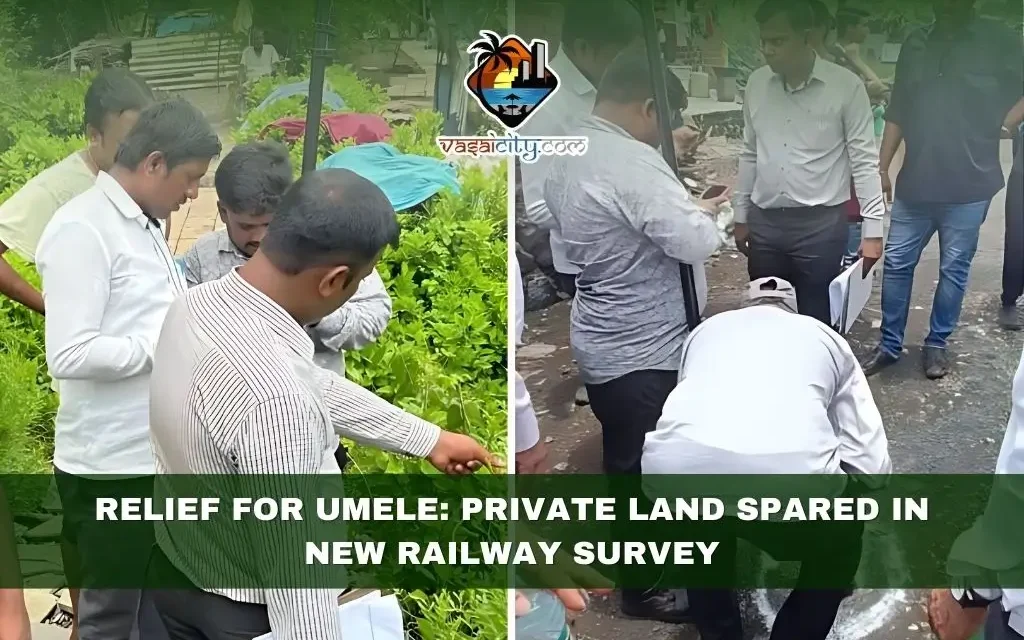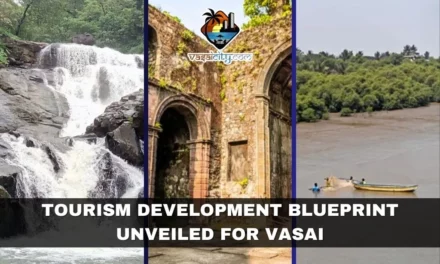Vasai: The residents of Umele village in Naigaon can finally breathe a sigh of relief as the latest survey conducted for the proposed railway line has spared private land from acquisition. This decision comes after a previous survey, which had mistakenly included private properties, leaving villagers worried and distressed. To address the concerns raised by the affected communities, a fresh survey was undertaken, leading to the revised outcome.
The Background of the Railway Expansion
The ever-growing number of passengers on the Western Railway line, particularly between Borivali and Virar, has led to an increasing number of accidents and inconveniences for commuters. To mitigate these issues and provide smoother, safer travel for the public, a new railway corridor is being planned between Borivali and Virar. The construction of this new line will require approximately 16 hectares of land in the Vasai-Virar-Nalasopara belt.
As part of this expansion, a new yard will be built between Vasai and Naigaon, along with the addition of new railway lines. Specifically, the Western Railway plans to lay down five additional tracks between Virar and Borivali, accompanied by the construction of a 30-track yard. While this development is seen as a much-needed improvement in the region’s infrastructure, it initially raised concerns among residents of five villages in Vasai West—Umele, Umelman, Diwanman, Manikpur, and Navghar—as they feared their homes would be affected by the project.
Concerns and Distress Among Villagers
The original survey conducted by the railway authorities did not involve proper consultation with the local residents. As a result, private land in Umele was mistakenly marked for acquisition. In particular, land parcels under Survey Number 21 in Umele were listed as part of the affected areas, sparking outrage among the villagers. The situation became more distressing when it was revealed that even though there was sufficient government land available, private properties were still being considered for acquisition.
This lack of communication and the erroneous inclusion of private land led to growing anger and frustration among the residents. Many felt that their voices were being ignored and that their homes were at risk of being taken away without their consent. The villagers expressed their dissatisfaction through various means, including protests and public appeals, demanding that the railway authorities reconsider their decision.
The residents’ concerns were not just about losing their homes; they also feared the disruption of their lives, the loss of their ancestral lands, and the impact on their community’s social fabric. The potential displacement of families and the destruction of their properties were significant concerns that fueled their resistance to the project as initially proposed.
Railway Authorities Reevaluate and Correct the Survey
In response to the escalating tensions and the legitimate concerns raised by the villagers, the railway authorities decided to reassess the situation. They initiated a new survey to accurately determine which lands were necessary for the project and which could be spared. The goal was to find a solution that would minimize the impact on the local communities while still allowing the railway expansion to proceed.
After conducting the new survey, the railway authorities issued a revised notification, clarifying that no private land in Umele, particularly those under Survey Number 21, would be acquired for the railway project. This announcement was a significant relief for the residents, who had been living in uncertainty and fear since the initial survey.
Social activist Ashish Vartak, who has been closely following the developments, expressed his satisfaction with the revised survey. He stated that the correction was a much-needed step and that the villagers could now rest easy, knowing that their homes and lands were safe. The initial confusion caused by the earlier survey had created a great deal of anxiety, but the new survey has resolved those issues, providing the clarity that the villagers had been seeking.
The Importance of Proper Communication and Community Involvement
This entire episode highlights the importance of proper communication and community involvement in large-scale infrastructure projects. The initial survey’s errors and the lack of engagement with the affected residents led to unnecessary distress and conflict. However, the willingness of the railway authorities to listen to the concerns of the villagers and to take corrective action demonstrates the value of responsive governance.
It is crucial for government bodies and agencies to ensure that local communities are kept informed and involved in the decision-making processes that affect them. When residents are left in the dark or feel that their concerns are being ignored, it can lead to mistrust and opposition, as seen in the case of Umele. On the other hand, when authorities take the time to engage with the community, understand their needs, and address their concerns, it can lead to more positive outcomes for all parties involved.
Looking Ahead: The Future of the Railway Expansion
With the revised survey now in place, the railway project between Borivali and Virar is expected to move forward more smoothly. The new corridor will eventually ease the daily commute for thousands of passengers, reducing travel time and improving safety on the tracks. The construction of additional tracks and the new yard will help to decongest the existing lines, allowing for a more efficient and reliable railway service.
While the residents of Umele and the other affected villages can now look forward to the future with less apprehension, the railway authorities must continue to engage with the local communities as the project progresses. Ensuring that residents are kept informed and involved in any further developments will be key to maintaining the trust and cooperation that has been established through this revised survey process.
In conclusion, the latest developments in the railway expansion project are a reminder of the need for careful planning and open communication in public infrastructure initiatives. By correcting the mistakes of the past and prioritizing the well-being of the local communities, the railway authorities have taken an important step towards building a better future for all those who rely on the Western Railway’s services.













